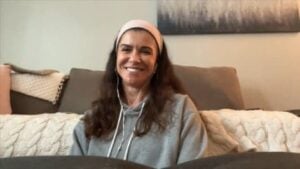How Jessy separated herself from her thoughts, moved away from medication, and transformed her relationship with sleep (#50)
Jessy experienced sleep disruption due to the stress of COVID and the breakup of her community. Initially, she found it difficult to fall asleep. Then she started waking during the night and found it hard to get back to sleep.
As her sleep got progressively worse, Jessy started to feel scared and worried that she was losing control of her life.
She tried medication but it didn’t help. She felt desperate and alone.
After finding the Insomnia Coach podcast, she found hope in the stories of others. That encouraged her to start taking her life back from insomnia, even while it was still present. She did more of what mattered. She stopped trying to control sleep. She moved away from struggling with her thoughts and feelings (and as she did that she found that her mind could be an unreliable narrator).
Today, Jessy considers her sleep to be normal and she feels that her experience with insomnia gave her the opportunity to recognize her own resilience and that gave her the confidence to move forward in life.










